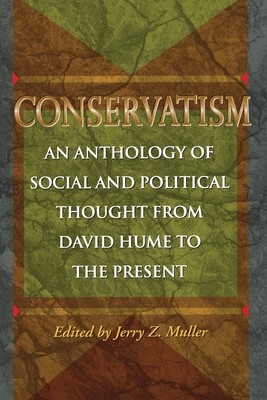
- We will send in 10–14 business days.
- Author: Jerry Z Muller
- Publisher: Princeton University Press
- ISBN-10: 0691037116
- ISBN-13: 9780691037110
- Format: 15.5 x 23.6 x 2.8 cm, softcover
- Language: English
- SAVE -10% with code: EXTRA
Reviews
Description
At a time when the label "conservative" is indiscriminately applied to fundamentalists, populists, libertarians, fascists, and the advocates of one or another orthodoxy, this volume offers a nuanced and historically informed presentation of what is distinctive about conservative social and political thought. It is an anthology with an argument, locating the origins of modern conservatism within the Enlightenment and distinguishing between conservatism and orthodoxy. Bringing together important specimens of European and American conservative social and political analysis from the mid-eighteenth century through our own day, Conservatism demonstrates that while the particular institutions that conservatives have sought to conserve have varied, there are characteristic features of conservative argument that recur over time and across national borders.
The book proceeds chronologically through the following sections: Enlightenment Conservatism (David Hume, Edmund Burke, and Justus Möser), The Critique of Revolution (Burke, Louis de Bonald, Joseph de Maistre, James Madison, and Rufus Choate), Authority (Matthew Arnold, James Fitzjames Stephen), Inequality (W. H. Mallock, Joseph A. Schumpeter), The Critique of Good Intentions (William Graham Sumner), War (T. E. Hulme), Democracy (Carl Schmitt, Schumpeter), The Limits of Rationalism (Winston Churchill, Michael Oakeshott, Friedrich Hayek, Edward Banfield), The Critique of Social and Cultural Emancipation (Irving Kristol, Peter Berger and Richard John Neuhaus, Hermann Lübbe), and Between Social Science and Cultural Criticism (Arnold Gehlen, Philip Rieff). The book contains an afterword on recurrent tensions and dilemmas of conservative thought.EXTRA 10 % discount with code: EXTRA
The promotion ends in 17d.23:49:19
The discount code is valid when purchasing from 10 €. Discounts do not stack.
- Author: Jerry Z Muller
- Publisher: Princeton University Press
- ISBN-10: 0691037116
- ISBN-13: 9780691037110
- Format: 15.5 x 23.6 x 2.8 cm, softcover
- Language: English English
At a time when the label "conservative" is indiscriminately applied to fundamentalists, populists, libertarians, fascists, and the advocates of one or another orthodoxy, this volume offers a nuanced and historically informed presentation of what is distinctive about conservative social and political thought. It is an anthology with an argument, locating the origins of modern conservatism within the Enlightenment and distinguishing between conservatism and orthodoxy. Bringing together important specimens of European and American conservative social and political analysis from the mid-eighteenth century through our own day, Conservatism demonstrates that while the particular institutions that conservatives have sought to conserve have varied, there are characteristic features of conservative argument that recur over time and across national borders.
The book proceeds chronologically through the following sections: Enlightenment Conservatism (David Hume, Edmund Burke, and Justus Möser), The Critique of Revolution (Burke, Louis de Bonald, Joseph de Maistre, James Madison, and Rufus Choate), Authority (Matthew Arnold, James Fitzjames Stephen), Inequality (W. H. Mallock, Joseph A. Schumpeter), The Critique of Good Intentions (William Graham Sumner), War (T. E. Hulme), Democracy (Carl Schmitt, Schumpeter), The Limits of Rationalism (Winston Churchill, Michael Oakeshott, Friedrich Hayek, Edward Banfield), The Critique of Social and Cultural Emancipation (Irving Kristol, Peter Berger and Richard John Neuhaus, Hermann Lübbe), and Between Social Science and Cultural Criticism (Arnold Gehlen, Philip Rieff). The book contains an afterword on recurrent tensions and dilemmas of conservative thought.

Reviews